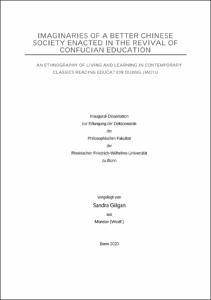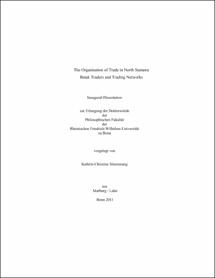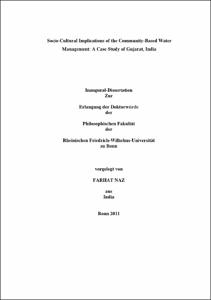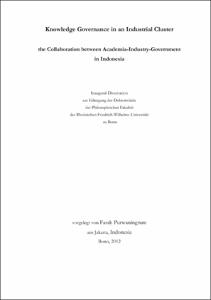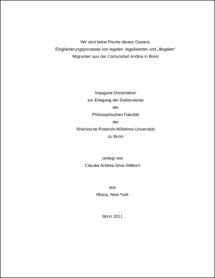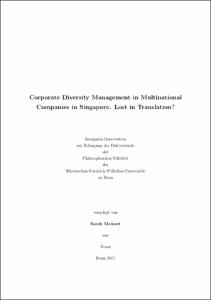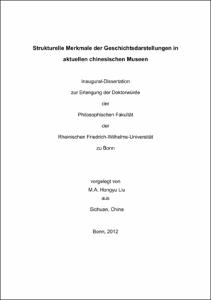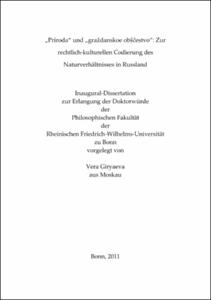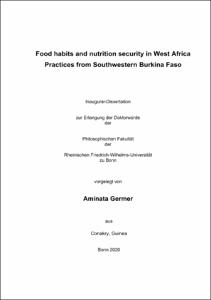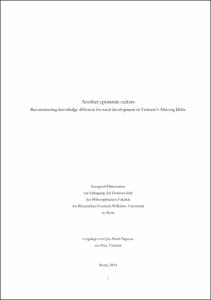E-Dissertationen: Suche
Anzeige der Dokumente 1-10 von 43
Imaginaries of a better Chinese society enacted in the revival of Confucian education: An ethnography of living and learning in contemporary classics reading education dujing jiaoyu
(2020-08-11)
Studying Confucian classics is commonly known as core activity in Chinese imperial education – at least for young men who sought a career as government official. When this learning technique reappeared in classrooms of ...
The Organisation of Trade in North Sumatra: Batak Traders and Trading Networks
(2011-08-11)
A brisk, flourishing and independent local commerce and the integration of the population into local and regional trading structures are important basic conditions for the development and welfare of a region. Both are ...
Socio-Cultural Implications of the Community-Based Water Management: A Case Study of Gujarat, India
(2011-08-04)
Failure of the state-led development projects and the growing concerns for participation, in the 1980s and 1990s gave rise to community-based natural resource management (CBNRM). This in turn led to a paradigm shift in ......
In den 1980ern und 1990er Jahren führten Naturschutz- und Konservierungkomponenten in Entwicklungsprojekten zum community-based natural resource management (CBNRM). Dies leitete einen Paradigmenwechsel im vom System ......
In den 1980ern und 1990er Jahren führten Naturschutz- und Konservierungkomponenten in Entwicklungsprojekten zum community-based natural resource management (CBNRM). Dies leitete einen Paradigmenwechsel im vom System ......
Knowledge Governance in an Industrial Cluster: the Collaboration between Academia-Industry-Government in Indonesia
(2013-01-17)
The study is situated in the debate about ‘knowledge for development’ by looking at the inter-linkage of academia-industry-government in the Indonesian science system. The research is based on 10 months of fieldwork conducted ......
Wir sind keine Fische dieses Ozeans: Eingliederungsprozesse von legalen, legalisierten und „illegalen“ Migranten aus der Comunidad Andina in Bonn
(2011-06-01)
Dieses Forschungsprojekt als Ziel, Integrationsprozesse von Migranten zu untersuchen, unter besonderer Betonung der irregulären Migration. Um die Spezifizität der Eingliederungsprozesse irregulärer Migranten entdecken zu ...
Corporate Diversity Management in Multinational Companies in Singapore. Lost in Translation?
(2011-11-24)
The research deals with the concept of workforce diversity management that has gained popularity in recent years because of increasing diversification of employees, customers, markets and stakeholders. In this context, ...
Strukturelle Merkmale der Geschichtsdarstellungen in aktuellen chinesischen Museen
(2012-12-10)
In der Dissertation werden die charakteristischen Merkmale der vier Museumstypen der Volksrepublik China dargestellt: Nationalmuseen, Museen als Kulturdenkmäler, regionale Zentralmuseen und private Museen. Hierbei liegt ...
„Priroda“ und „graždanskoe obščestvo“: Zur rechtlich-kulturellen Codierung des Naturverhältnisses in Russland
(2011-06-01)
In der Arbeit wird das Naturverhältnis, d.h. die Vorstellung der Natur in Literatur, Kunst, Religion und Recht [Gephart, 2002] in Russland analysiert. Das Naturverhältnis wird in vier Dimensionen - in eine normative, ...
Food habits and nutrition security in West Africa: Practices from Southwestern Burkina Faso
(2020-10-30)
Background: The southwestern part of Burkina Faso (BF) like the whole country faces severe vulnerability to food and nutrition insecurity, which is characterised by a cyclical up and down, and particularly by a high rate ...
Another epistemic culture: Reconstructing knowledge diffusion for rural development in Vietnam’s Mekong Delta
(2014-07-01)
In the age of “post-industrial society” and “knowledge economy,” how do agrarian communities in developing countries talk, think, and apply knowledge for their everyday life and production? Does a farmer become a “knowledge ......


